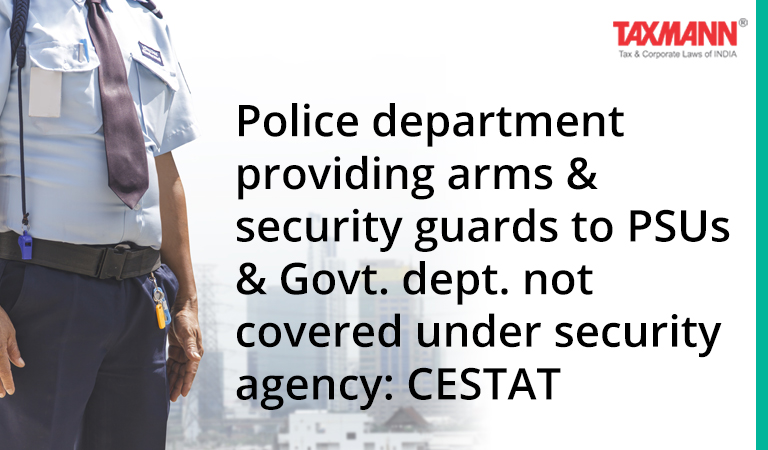Police department providing arms & security guards to PSUs & Govt. dept. not covered under security agency: CESTAT
- Blog|News|GST & Customs|
- 2 Min Read
- By Taxmann
- |
- Last Updated on 26 October, 2021

Case Details: Superintendent of Police (Rural) v. Commissioner of Central Excise, Aurangabad - [2021] 131 taxmann.com 275 (Mumbai - CESTAT)
Judiciary and Counsel Details
-
- Dr. Suvendu Kumar Pati, Judicial Member and Sanjiv Srivastava, Technical Member
-
Sumeet Tholle, CA for the Appellant. Dilip Shinde for the Respondent.
Facts of the Case
The appellant was a part of Maharashtra State Police force providing arms, security guards to public sector banks/undertakings and government departments under Section 13 of Police Act, 1861 on collection of actual expenditure/cost, which was called as consideration under the contract. The department issued order of demand of service tax on the ground that providing armed security guards to public sector banks/undertakings and government departments would be covered under the definition of ‘security services’ and collection of charges for the same would be liable to service tax. The appellant filed appeal against it.
CESTAT Held
The honorable CESTAT observed that the appellant was performing statutory duties and the amount so collected would have been deposited in the government treasury. The CESTAT relied on the CESTAT decision vide Final Order No. 55321-55348 dated 25-11-2016 in the case of Dy. Commissioner of Police & Others v. CCE, Jaipur & Others, where it was concluded that the police department which is in the agency of State Government cannot be considered to be a person engaged in the business of running security services. Therefore, it was held that the activity undertaken by the police would not be covered by the definition of security agency under section 64(94) of the Finance Act, 1994 and demand was liable to be set aside.
Disclaimer: The content/information published on the website is only for general information of the user and shall not be construed as legal advice. While the Taxmann has exercised reasonable efforts to ensure the veracity of information/content published, Taxmann shall be under no liability in any manner whatsoever for incorrect information, if any.

Taxmann Publications has a dedicated in-house Research & Editorial Team. This team consists of a team of Chartered Accountants, Company Secretaries, and Lawyers. This team works under the guidance and supervision of editor-in-chief Mr Rakesh Bhargava.
The Research and Editorial Team is responsible for developing reliable and accurate content for the readers. The team follows the six-sigma approach to achieve the benchmark of zero error in its publications and research platforms. The team ensures that the following publication guidelines are thoroughly followed while developing the content:
- The statutory material is obtained only from the authorized and reliable sources
- All the latest developments in the judicial and legislative fields are covered
- Prepare the analytical write-ups on current, controversial, and important issues to help the readers to understand the concept and its implications
- Every content published by Taxmann is complete, accurate and lucid
- All evidence-based statements are supported with proper reference to Section, Circular No., Notification No. or citations
- The golden rules of grammar, style and consistency are thoroughly followed
- Font and size that’s easy to read and remain consistent across all imprint and digital publications are applied



 CA | CS | CMA
CA | CS | CMA
